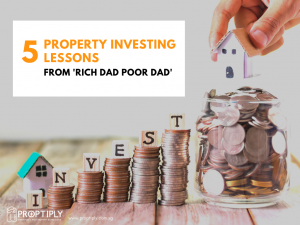
Robert Kiyosaki’s famous book, ‘Rich Dad, Poor Dad’, is the starting point for many aspiring investors seeking to learn about money management and financial freedom. Here are 5 key takeaways from ‘Rich Dad, Poor Dad’ that can be applied to property investing.
- Concentrate on buying income-producing assets while keeping liabilities low
Assets generate income, helping to put money into your pocket. On the other hand, liabilities cause you to take out money from your pocket. According to Rich Dad, the key difference between the rich and not-so-rich is that the latter spends their lives buying liabilities instead of assets. To attain wealth, you need to concentrate on acquiring income producing assets such as properties which can generate rental income.
- Positive cash flow is key to financial freedom
To be truly financial free, you need to have assets that produce enough passive income to cover your expenses each month. For example, if you have an investment property, you should receive sufficient rental income or cash flow each month to cover your mortgage and other expenses required to rent out your property. In this scenario, your investment will already pay for itself and the positive cash flow leftover is your residual income.
- View market downturns are an opportunity
When the economy or property market is in a downcycle, savvy property investors will view this as an opportunity to buy assets at a discounted price. During a market correction, profits can be made when buying. It is also important to keep a sound mind and resist the temptation to sell due to panic. Evaluate your options carefully and be careful not overpay for a property otherwise it will take you a longer time to earn back your money.
- Use good debt and other people’s money to scale
Using your own money to build your property investment portfolio takes time come to fruition. It also only produces modest returns. An alternative is to use, in Rich Dad terms, other people’s money or OPM for short. This is a key concept of Rich Dad and has the potential to create a better return on investment. “Good debt” is part of OPM because it is a debt that “puts money in your pocket”. For example, a loan for your investment property could be considered a good debt if the rental income from your property is able to service your debt and provide you with residual monthly income at the same time.
- Make money work for you instead of working for money
In the process of building wealth, you should aim to own more assets that actually “put money in your pocket”. Cars or the house that you live in do not count as assets in the Rich Dad sense. Instead, it’s assets such as stocks, business, or rental investment property that count. The more income-producing assets you own, the less you will need to rely on your actual job salary to make ends meet.